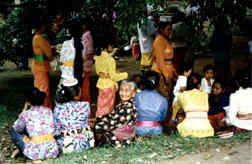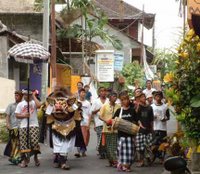I've been to Jamaica a few times, two of them in the early '90's. Before I had been to Jamaica, I had traveled all over Europe and the States, but nowhere in the third world. Jamaica hit me like brick. I loved it; nowhere had ever affected me like Jamaica. By the end of my first trip, I felt like I lived there, and I had a great deal of trouble reintegrating on my return. So I had to go back.
Negril was my base. I always meant to get to Kingston and Spanish Town, but the pull of Negril was strong. It was so laid back there, yet there was always an underlying tension of something about to happen. Maybe it was just the beat of Jamaica, a beat that went beyond the reggae, beyond the house music. I felt it on the streets of Savannah la Mar, Mo Bay,Treasure Beach and even Mandeville, but I felt it most strongly in Negril.
The beach in Negril was wide and white and soft. The water was gentle, warm, and clear blue. I loved the shacks,the chickens, the bars overlooking rocky cliffs, the ganja smell in the air, the sound of patois, the ever-present music. There were many exciting places,some local, some for tourists. But there was one that boiled down the essence of Negril for me, one place I had to take my traveling companion, Dru, on my second trip. I had to have dinner at Alwyn's.
Alwyn had a shack on the beach where he cooked absolute gourmet delights on a Coleman stove. He would cook anything to order, breakfast, lunch and dinner, but he expected you to make reservations. The first time I went to Alwyn's I had failed to make reservations. This meant he had not bought fish or other fresh things especially for my dinner, so my choices were snapper or lobster, made any way I liked, with a variety of sauces. I was not disappointed. Alwyn's prices were great, and if we were still hungry, we needed only yell "Alwyn! More fish!" for one of Alwyn's assistants to appear with another steaming plate, all included in the price.
Alwyn's was primarily a locals hang-out. If you walked by Alwyn's and didn't know better, you might have thought it was a large group of friends sitting around visiting, and not even realize you were passing by a wonderful restaurant. But, of course, the smell of Alwyn's spicy sauces filling the air gave it away for what it was.
I remembered evenings at Alwyn's sitting at a table on the beach after sundown, or even better, the built-up hill of sand with shells packed into the sides that Alwyn called the "balcony". (The hill was destroyed years ago by Hurricane Gilbert.) We would listen to the waves roll in, faces lit only by candles while we talked with Jamaican friends, or sometimes an adventurous tourist.
Alwyn's was equally pleasant in the heat of the day. I would lay in a hammock in the balcony, after the breakfast crowd left (indeed,he had a breakfast crowd that couldn't get enough of his ackee and saltfish), and talk to whoever else was around about rastafarianism, or music, or the latest gossip. (Negril's a small town, and everybody knows everybody.) Alwyn would bring me a papaya juice on a tray, as I lay in my hammock, and tell me formally, "Thank you. Come again." Eventually most anybody I had met who lived or had relatives in Negril would come by to buy a beer or a Ting from Alwyn. I anticipated all this on my return trip.

Dely was sort of the Maitre D' at Alwyn's. He also sold items to tourists, like hats or rafts, and even brownies and ganja for those so inclined, hence Dely's nickname, "Happy Time". Dely, at the time,was probably in his late 30's and a self-styled Rasta, usually wearing a Rasta-type hat, but occasionally setting his medium length dreadlocks free, or ensconcing them in a bright pink baseball cap that said "Jamaica" on the front. There was always something a little incongruous about seeing Dely take his daily jog on the beach in his Rasta cap. Conversations with Dely about the meaning of life had been a focal point of my prior visit, and I looked forward to seeing him again, as well as introducing my traveling companion, Dru, to Alwyn's down-home Jamaican cooking.
When I awoke the morning after arriving on my return trip, I wanted to make reservations immediately. I hadn't yet seen anybody I knew that I wanted to see, and I knew one trip to Alwyn's would solve that. Alwyn's was more than a restaurant; it was a vital Beach nerve center. Dru, however, wanted to set out first thing to Booby Cay, a very small island off Negril known for the Hedonism Crowd's antics. I reluctantly agreed. It was very early, and since nobody I knew was at the Water Sports shack, we wandered down the beach, and made a good deal with Henry, a pleasant, rather heavy set fellow to take us over for a few hours on his glass bottom boat, the African Star. Henry and his assistant, "All Right" (was the blond tint on those dreadlocks real?), took Dru and I over along with a middle-aged German couple. It was about as expected, the Hedonism crowd self-consciously indulging in structured drinking games in an effort to shed clothing so casually discarded on the main beach in Negril.
After a very short while, the Hedonism crowd was getting on my nerves, blaring rock from a boom box was giving me a headache, and I was yearning to hear some mellow reggae. When Henry stopped back to check on Dru and me a little early, I nearly fell into his boat in my effort to board it quickly. The middle-aged German couple climbed aboard too. Instead of dropping us on the beach in front of our hotel, I asked Henry to drop us at Alwyn's, so I could make reservations for the evening.
As the boat pulled up to Alwyn's, Dely waded out into the water when he saw us approach. He yelled, "Alwyn is not here! The restaurant is closed!" Then we drew closer. I said, "Happy Time!" He said "Every time!" I said, "All the Time!" Then he really looked at me, did a double take, smiled broadly, shook my hand, and said, "Oh! It's you!" So Dely jumped in the boat and rode back to our end of the beach with us.
I told Dely I hadn't seen anybody I knew except Trevor, who I could do without. Dely said, "Rasta?" I nodded. Anyway, Dely asked, "You haven't seen Dr. Quality?" Before I could answer, we passed a speed boat at the dock, and Dely said, "There he is in the green shorts!" and pointed to Quality standing in his unmoving parasailing boat. Dely signaled Quality with a circular, Arsenio Hall- like arm movement. Negril was filled with personalities, and certainly Quality was one of the best known. Whether this was because of his status as a competitive wind-surfing champion, or his formidable ability to throw a lot of tourist business to other participants in the local (often black-market) economy, or a bit of both, I don't know, and I'm not likely to ever find out.

Our boat continued onward, but a few seconds later, Dru yelled, "He's following us!" And there was Quality, speeding behind us toward the beach. Henry dropped us at the beach by our hotel; Quality arrived shortly thereafter, after docking his boat. By that time, thanks to the nearby beach bar, Dru and I were drinking rum punch. A few of Quality's friends wandered over, as well as some Italian tourists Dru and I had met the evening before. Since it was Quality's birthday, the crowd made plans to help him celebrate it that evening. Which brought us to the topic of dinner again. Where were we going to eat? We all bemoaned the fact that Alwyn was still in the country, and his restaurant was closed, for that left the party with a definite hole around dinner time.
Of course, we managed to have dinner, and went from there to dance to reggae and drink flaming tropical concoctions. The next morning, I pulled on my swim suit, and still feeling the rum hurricanes from the night before, I walked down the beach to see if Alwyn had returned. I found Dely beside himself because Alwyn was still absent. Dely said Alwyn was in the hills, "chasing the girls." This was a little hard for me to imagine, as Alwyn was an extremely mild sort. I think Dely was just trying to malign Alwyn, but, who knows, maybe still waters ran deep.
I began to give up hope when on the following day Alwyn had still not returned. Dely was in even more of a snit. "No respect! No respect!" Dely muttered, as he angrily swept the sand in front of the "balcony". (I had no idea why sand needed to be swept, and I had to suppress a giggle. He really should have been managing a five star restaurant in Miami or New York.) "I am just going to quit and go back to the country for six months, maybe a year!" Dely continued, sweeping furiously. Then, he stopped sweeping, leaned on his broom, looked at me and demanded, "Is this any way to run a business?!!"
I carried on my vacation, and I had the expected great time, but I regretted that Dru would miss Alwyn's cooking. The day before I left Negril I was lying on a lounge chair reading a book, listening to the soft waves roll in and trying to soak up the last rays before heading back to the land of ice fishing. (I lived in Minnesota at the time, which goes a long way toward explaining my infatuation with Jamaica.) Several yards away, the beach bar was playing Ziggy Marley's "Tomorrow People," and the smell of ganja floated in and out of my consciousness. Out of the corner of my eye I saw Dely jogging past me on the beach. As he jogged by, he called, "Yo! Alwyn's back!"
Dru had already gone home, but the Italians and I dined grandly that night.
PHOTOS: 1. Dely ("Happy Time") in front of Alwyn's
2. The Italians









